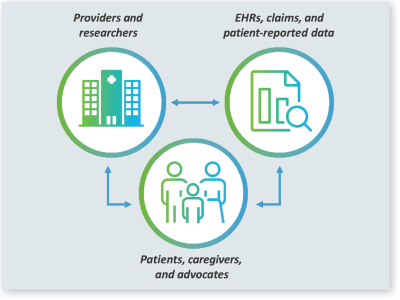
2024 marks the 10-year anniversary of PCORnet® — a national patient-centered clinical research network developed with funding from the Patient Centered Outcomes Research Institute (PCORI) to support a transformational shift toward national-scale, patient-centered comparative clinical effectiveness research. What started as a vision to bypass the traditional silos hindering research insights has since become a powerful infrastructure with proven success across hundreds of studies seeking fast, representative answers that are meaningful to patients and caregivers. The DCRI has played a major role in the success of PCORnet. Here are 5 ways the DCRI has helped PCORnet achieve success over the past decade:
- Uniting Health Records Nationwide: The heart of PCORnet is a vast network of eight Clinical Research Networks (CRNs), seamlessly integrating health records from more than 40 million healthcare encounters annually across the United States. The ability to harness these data allows researchers to complement randomized controlled trials with evaluations of therapies under real-world conditions in a broad population. However, keeping these CRNs organized and working together is made possible by a hard-working project management office that is highly responsive and skilled at troubleshooting administrative challenges across the U.S.
- Making Data Usable: The introduction of the PCORnet® Common Data Model (CDM) revolutionized how data from CRNs are organized and used within the Network. Before the PCORnet® CDM, data from CRNs across the country were all coded in disparate formats, requiring research teams to translate them into a common language before they could be combined and used to generate evidence. The PCORnet® CDM solves this challenge by standardizing data formats across PCORnet® CRNs upfront, which allows users of the Network to ask the same question to millions of people at once and receive a cohesive answer. As the PCORnet® CRNs build knowledge around Electronic Health Record and claims data used for research purposes, they are constantly refining based on continuous learning. PCORnet data curation learnings are shared on GitHub, an open-source project accessible to all. A team of data scientists at the DCRI work hard to ensure coordination across the CRNs so that data made available through PCORnet is high-quality and accessible.
- Connecting Stakeholders: The PCORnet infrastructure was designed to tackle the challenge of research silos by fostering collaboration among researchers, patients, and therapeutic experts. Key to this collaboration is communication and the DCRI has supported information about PCORnet through its Research Communications and Engagement (RCE) team.
- Answering Priority Questions for Patients: The questions that researchers study may not always align to the answers patients seek. But with patient insights accessible to PCORnet users from the very start, the Network has enabled answers to many high-priority questions for patients and caregivers. For example, the landmark PCORnet® ADAPTABLE Study was named as a Top 10 Research Achievement for its innovative pragmatic design that included creation of a Patient Review Board comprised of “Adaptors,” the patient leaders engaged to help lead ADAPTABLE. To help others implement similar trial designs, the study team published a manuscript detailing how it activated engagement, including a description of committee structures and composition, first-hand Adaptor testimonials, specific contributions of the Adaptors, and lessons learned during the planning phases and early implementation of ADAPTABLE. Building from lessons learned in ADAPTABLE, the DCRI has gone on to lead other impactful PCORnet® Studies such as PREVENTABLE, Test-to-Treat, V-Inclusion, cvMOBIUS, and many others.
- Informing National Responses to COVID-19: Many staff and faculty throughout the DCRI raised the bar for rapid response and surveillance during the COVID-19 public health crisis using PCORnet. The HERO program rapidly created a registry of healthcare workers to participate in HERO-HCQ, a clinical trial that evaluated use of hydroxychloroquine as COVID-19 prevention and then HERO-Together, a vaccine surveillance study. ACTIV-6, also led by DCRI faculty, examined how repurposed medications could reduce symptoms of non-hospitalized participants with mild to moderate COVID-19. The applications of PCORnet during the COVID-19 pandemic serve as a blueprint for future public health crises.
The DCRI’s leadership in PCORnet has been instrumental in improving clinical research in the U.S. over this last historic decade and staff and faculty throughout the DCRI will continue to innovate and enhance the power of PCORnet in the decade to come! Supporting the Coordinating Center for PCORnet® is an expansive effort that has required support from across the DCRI. See the timeline to learn more about the journey of PCORnet over the past decade.